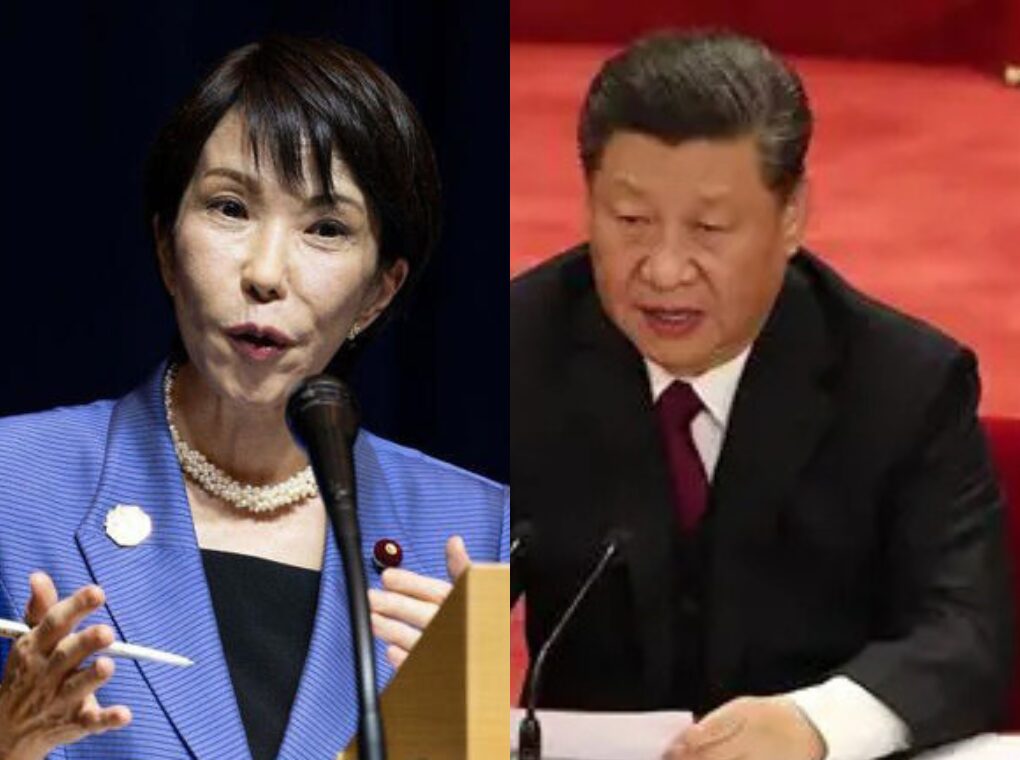China has delivered one of its most direct military threats to Japan in years, warning Tokyo of severe consequences if it intervenes in any future conflict over Taiwan. The message—raw, pointed, and steeped in historical resentment—comes amid a rapid escalation of diplomatic hostilities between Asia’s two largest powers.
The confrontation erupted after Japan’s new Prime Minister, Sanae Takaichi, suggested that Tokyo could deploy military force if China attacked Taiwan, a stance that sharply departs from Japan’s traditionally cautious ambiguity on the issue.
What Sparked the Latest Crisis?
The tensions began last Friday during a parliamentary session in Tokyo.
A lawmaker asked Takaichi under what circumstances the situation around Taiwan would trigger a “survival-threatening situation”—a legal provision under Japan’s 2015 security laws allowing the use of military force.
Takaichi replied:
“If there are battleships and the use of force, no matter how you think about it, it could constitute a survival-threatening situation.”
Under Japanese law, such a scenario would allow Japan’s Self-Defense Forces (SDF) to intervene militarily to assist allies—effectively the United States—if Taiwan were attacked.
Beijing immediately denounced the remarks as “egregious.”
By Saturday, the rhetorical clash intensified when Xue Jian, China’s consul general in Osaka, reshared an article about Takaichi and added the chilling comment:
“The dirty head that sticks itself in must be cut off.”
Japan swiftly lodged a formal protest, calling the remark “highly inappropriate.” China lodged its own protest in response.
China’s Military Warning: ‘Those Who Play With Fire Will Perish’
With neither side backing down, Beijing escalated on Thursday.
During a press conference, Foreign Ministry spokesperson Lin Jian issued a thinly veiled threat:
“Japan must fully repent for its war crimes… and stop playing with fire on the Taiwan question. Those who play with fire will perish by it.”
Lin further warned that if Japan dares to intervene militarily:
“China will firmly exercise its right to self-defence under the UN Charter.”
He also reminded Japan that this year marks the 80th anniversary of China’s victory over Japanese aggression in World War II, evoking bitter historical wounds that still shape Chinese public sentiment and state messaging.
Historical Grievances Fuel Modern Hostilities
China and Japan have a long and violent history—from 19th-century clashes to Japan’s brutal wartime occupation of China.
These grievances, frequently invoked by Beijing, continue to strain relations.
Prime Minister Takaichi—known for her hawkish views on China, staunch support for Taiwan, and push for higher defense spending—has added new friction points. Her political rise has already rattled Beijing, which views her alignment with the US as part of a broader regional containment strategy.
Why Takaichi’s Remarks Mark a Major Shift?
Japan and the United States have historically followed a policy of “strategic ambiguity” on Taiwan:
Deliberately leaving unclear how they might respond in the event of a Chinese invasion.
Japanese leaders rarely make direct references tying Japan’s security to Taiwan’s fate.
Takaichi broke that pattern.
Her statement suggests Tokyo may no longer be willing to rely solely on ambiguity, but may instead signal its readiness to act—something Beijing perceives as a direct challenge to its sovereignty claim over Taiwan.
Is Asia on the Brink of a New Crisis?
The verbal clash has intensified concerns across the Indo-Pacific, where China’s military assertiveness, Japan’s strategic reorientation, and Taiwan’s vulnerable position create a dangerous geopolitical triangle.
Beijing’s warnings have grown more severe:
China sees Taiwan as an internal matter and warns it will not tolerate interference.
Japan fears a Chinese move on Taiwan would threaten its own territory, especially the nearby Okinawa region.
The US maintains close military ties with both, adding another layer of complexity.
Neither side seems willing to soften its stance.
As Takaichi flatly stated this week:
Her remarks were consistent with Japan’s established position—one she will not retract.
A Deepening Rift with Global Consequences
The standoff underscores how quickly Asia’s fragile stability can unravel.
With China invoking wartime memory and Japan signaling potential military involvement, both powers are entering their most confrontational phase in years.
Whether this remains a war of words—or becomes something more dangerous—may depend on the next moves in Beijing, Tokyo, and Washington.
